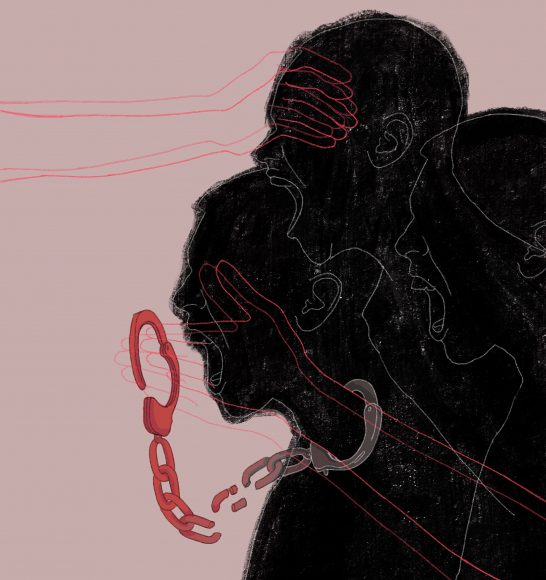
Illustration by Shiyue Zhang, special to the CU Independent
Updated 4/2/19: The article previously stated that Kielty was tased when in fact he was threatened with a taser.
Colin Kielty opened his door on the morning of August 12, 2017, to see trucks bearing neo-nazi decals parked in front of his house. Young white men in polo shirts and khaki shorts sat in open-bed pickup trucks, waving Confederate flags as neighbors shouted at them to leave. The second day of the Unite the Right rally in Charlottesville, VA was about to begin.
The day progressed into violence. Kielty saw people with shields engage with others, projectiles like tear gas thrown in different directions, medics responding to people who were hurt. Then he was threatened with a taser.
Stunned, Kielty saw a neo-nazi poised with the weapon eventually leave with other alt-right protestors. Yet after his experience, Kielty still feels that he was lucky. He is white. He is male. He couldn’t imagine what other minority groups in the area must have been feeling.
The Unite the Right rally, more commonly known as the Charlottesville riots, is a controversial landmark in the conversation of free speech in the United States, particularly as it relates to college campuses.
On Thursday, March 21, President Donald Trump signed an executive order to “protect free speech” across all public universities in the U.S. Free speech is defined in the First Amendment of the United States Constitution, which reads “Congress shall make no law respecting an establishment of religion, or prohibiting the free exercise thereof; or abridging the freedom of speech.” As it stands now, the order will direct 12 grant-making agencies to work with the Office of Management and Budget in an attempt to ensure that universities are complying with federal law.
Public universities like the University of Colorado Boulder are required to meet federal guidelines in order to receive federal funding. But many students and instructors at CU feel that free speech is a right that is already soundly supported, both in productive and damaging ways.
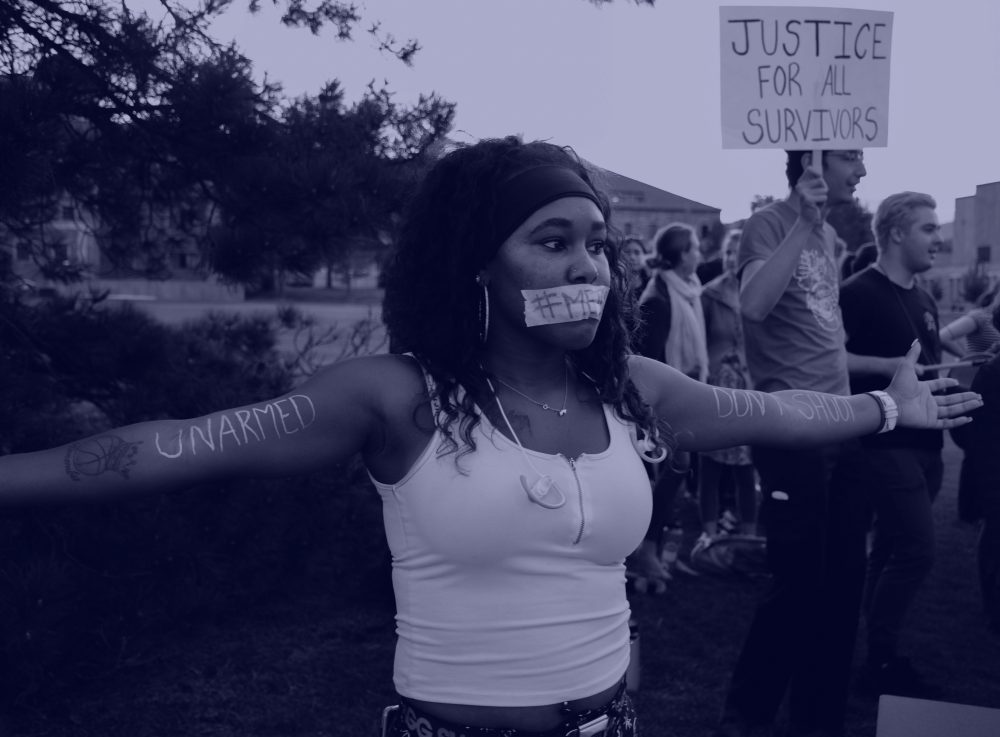
Shai Carter stands in silent protest, showing support for survivors and victims nationwide. Oct. 3, 2018. (Robin Fox/CU Independent)
After the Charlottesville riots, Kielty finished graduate school at the University of Virginia and now teaches at CU as a visiting scholar. Kielty’s class, “Free Speech and Dangerous Ideas” explores the philosophical foundations of free speech and how it operates today. To Kielty, free speech on campus is “pretty free.”
“It’s almost impossible to imagine any student leaving CU Boulder and going to a workplace where they have the same kinds of freedom to speak that they do here,” Kielty said. “Freedom of speech [at CU] is not only robustly protected but robustly encouraged in a way that is actually hard to find in other kinds of communities.”
A unanimous vote by CU’s Board of Regents in 2018 updated the university’s free speech policies to fall in line with Senate Bill 62, which ensures that free speech can occur in public spaces on campuses while prohibiting universities like CU from confining expression to just “free speech zones.”
In terms of hate speech, Kielty said that is protected on a university campus, too.
CU’s current policies state that while the university understands hate speech as “hurtful and offensive speech targeted against certain groups and individuals” it is still protected under university policy. The university does state that it will make efforts to “promote a culture of respect and civility.”
However, CU has repeatedly hosted controversial and provocative speakers such as Milo Yiannopoulos, Ann Coulter and Candace Owens. For Kielty, bringing these types of speakers is a “bad idea.”
“A commitment to free speech does not commit you to thinking that it is a good idea to bring controversial speakers on to campus,” Kielty said.
When asked about Trump’s executive order, Kielty said it is difficult to know what its exact ramifications will be for colleges.
“I do not by any means want to suggest that to use something in a political way is to use it inappropriately,” Kielty said. “However, I do think it is important to register the distinction between engaging in a philosophical discussion about something and to try to use a concept to pursue particular political ends, and I would assume that is what is being done in this instance.”
The president’s decision has left conservative groups on campus eager to see what the order may hold for free speech.
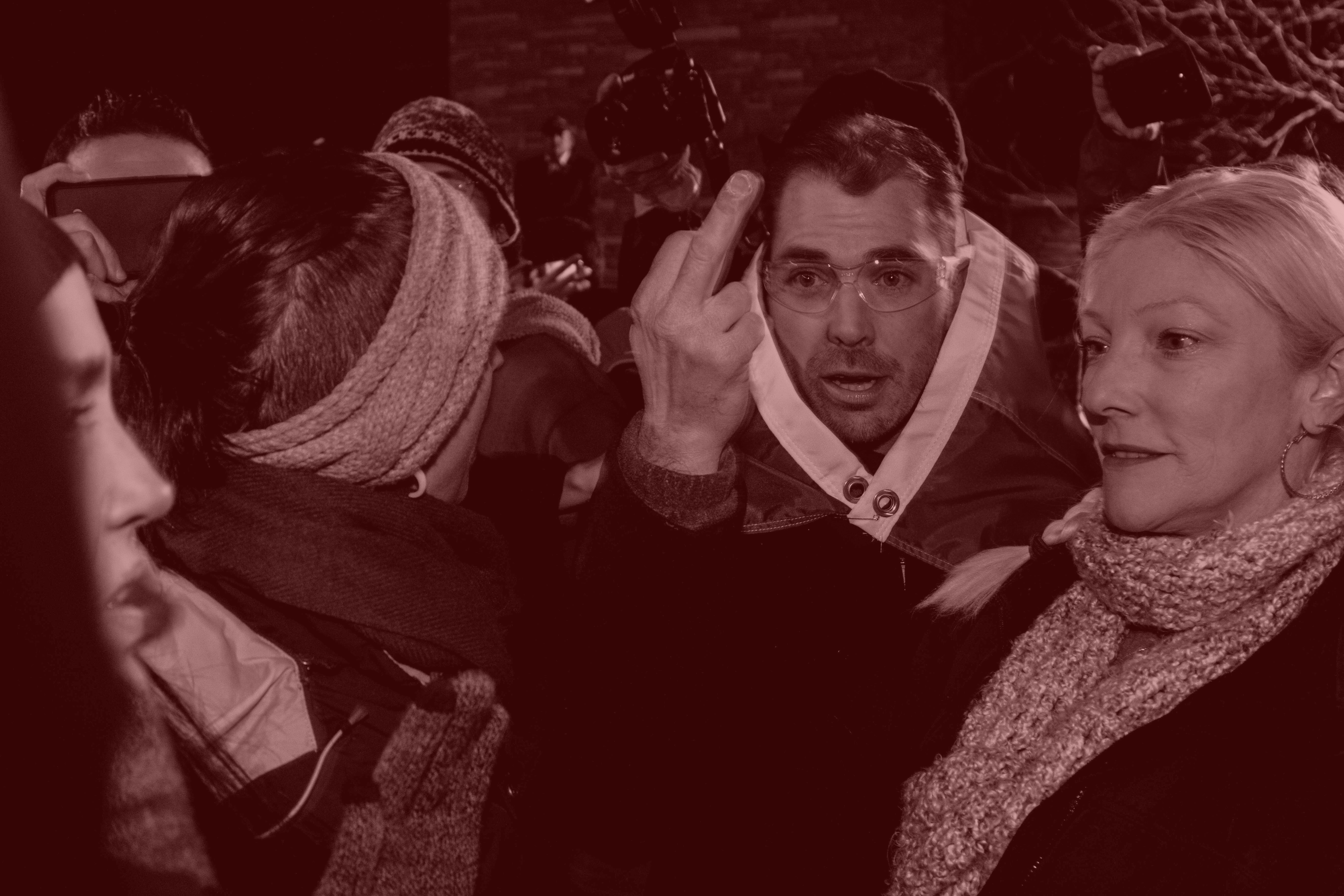
A Trump supporter amid protestors during Milo Yiannopoulos’ speaking event. Jan. 25, 2017. (Jackson Barnett/CU Independent)
“Without free speech, you couldn’t have the majority of things you see on campus today,” said Barret Barker, co-president of CU’s Turning Point USA (TPUSA) chapter. “I hold it higher than a lot of other things. To me it means everything.”
Barker has been with the conservative campus group since 2016 and hopes that the organization can provide a side that “a lot of people don’t get on campus.”
It’s a side that has been represented by conservative firebrands like Milo Yiannopoulos and Ann Coulter, whose CU visits have triggered protests from students. But Barker insists that speakers are not necessarily endorsed by the group, rather TPUSA wants to bring speakers who are “interesting to hear” even if some may consider their words hate speech.
“Hate speech still falls under free speech,” Barker said. “We’ve had speakers come and people say ‘well this is hate speech,’ well it’s still free speech.”
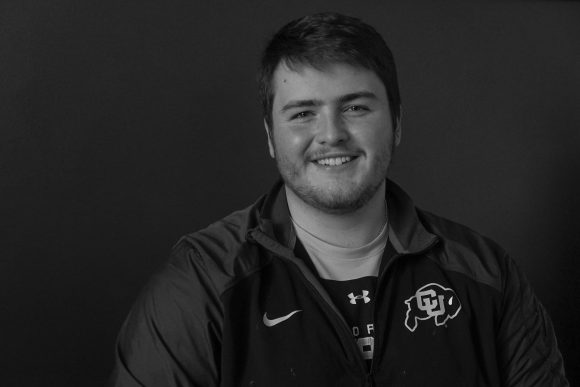
Barret Barker. March 20, 2019. (Fiona Matson/CU Independent)
This is not to say that TPUSA does not want disagreement — Barker “strongly encourages people to have opposing views” as a way for everyone to understand both sides.
“I think that [free speech] should be given the right to everybody on both sides,” Barker said.
Barker said he enjoys attending events that he may not necessarily believe in but finds important to spark “intellectual thinking.” Recalling Yiannopoulos’ 2017 campus visit, which drew over 200 protestors, Barker said he was pleased to see such a large turnout for both attendees and protestors. In a lot of ways, Yiannopoulos’ talk was a chance for TPUSA to “get its name out” to the CU campus.
Protestors and Yiannopoulos supporters stood in the cold winter air on the night of January 25, 2017. Despite security concerns from previous talks, Yiannopoulos was hosted with a full force of police officers equipped with pepper spray and batons. Supporters of the provocateur held signs which read “feminism is cancer” — a popular phrase of Yiannopolus — and “CNN lies” as protesters chanted “fuck these Nazis.”
“I’d say it was definitely a good event,” Barker said. “We’ve had a lot of good reaction, a lot of bad ones. The negative sides have always been having protestors out there, but that goes with free speech as well and they have the right to do that.”
The night was a testament to CU’s open policy towards free speech, and Barker said on behalf of himself and TPUSA, the university has been incredibly supportive. The proposed Trump executive order will bring little change to CU’s policies, believes Barker, who said CU is exceptional in its free speech tolerance.
“Personally I believe the content of [the executive order] is a good thing,” Barker said.
Still, Barker leans against the use of an executive order to enforce such a policy and said he would prefer to see it be handled in a legislative sense.
“It should not be a one-sided issue,” Barker said. “I think this is a non-partisan issue that both sides should be supporting.”
However, even TPUSA has faced the brunt of the problems that arise with free speech. Recently, TPUSA Communications Director Candace Owens made several comments regarding Adolf Hitler and nationalism.
“Whenever we say nationalism, the first thing people think about, at least in America, is Hitler,” Owens said. “He was a national socialist. If Hitler just wanted to make Germany great and have things run well, OK, fine.”
Following this, TPUSA’s CU chapter released a statement on Twitter that read “we do not believe Candace Owens to be the most effective representation for Turning Point USA, as Communications Director or otherwise.”
Barker said he would not comment further on TPUSA’s statement, yet it has led some students to question the limits of hate which free speech has allowed.
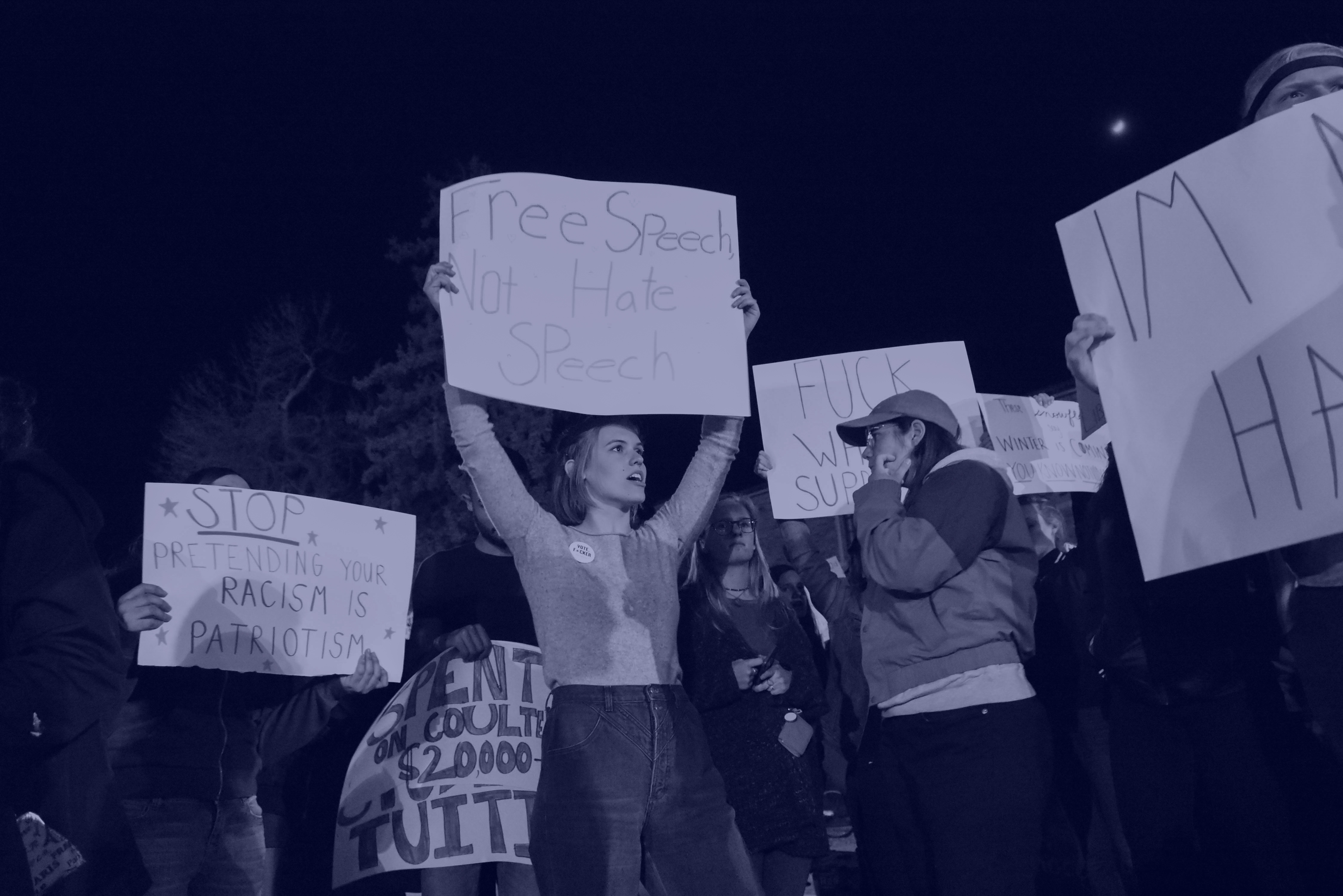
Protestors hold signs outside of Ann Coulter’s speaking event. March 21, 2018. (Fiona Matson/CU Independent)
As Ann Coulter addressed hundreds of students and community members during a TPUSA sponsored event on March 21, 2018, then-sophomore and former president of the Black Student Alliance, Gwendalynn Roebke, spoke to a huddled crowd inside Old Main.
Roebke, along with Women’s Resource Center (WRC) and the Gender and Sexuality Center, brought students together as part of a counter event to Coulter’s talk, which to Roebke was not free speech but “hate speech.” Roebke recalls the armed guards with snipers laying on the roof of the UMC, an image that only emboldened violence.
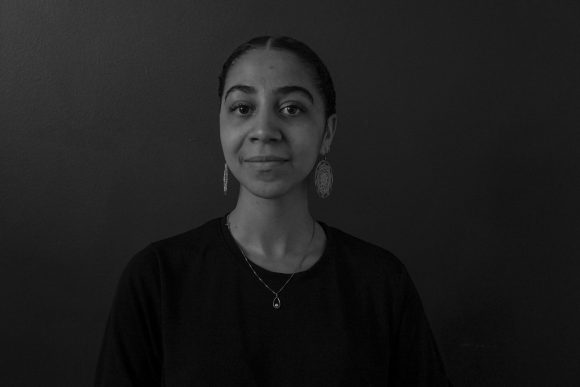
Gwendalynn Roebke. March 20, 2019. (Fiona Matson/CU Independent)
For Roebke, events like the alternative to Coulter’s talk intended to give a safe space away from the aggression and violence of the ensuing protest. Coulter’s talk and those who defended it as free speech only “normalized hate” said Roebke.
Speakers like Coulter, said Roebke, believe that certain people “don’t deserve to exist.”
“Or if they do deserve to exist, it’s to exist under others by virtue of your skin color or sexual orientation,” Roebke. “And that’s not productive.”
“Sensationalists” is the word Roebke uses to describe such speakers, who instead of saying anything of value, only say rhetoric that leads people to get hurt. Roebke believe the university’s decision to host speakers like Coulter and Yiannopoulos is a “tremendous waste of time and money” for people who are trying to “erase” marginalized groups of people through rhetoric.
“It’s protecting white heteronormativity,” Roebke said. “What they are advocating for is the forceful removal of people, is the forceful silencing of people, is borderline eugenics talk.”
Free speech has always protected the privileged in society, said Roebke. So when they heard about Trump’s executive order, they were “not surprised” — it is a move that Roebke sees as benefiting racists.
Growing up in Colorado Springs, Roebke said they are no stranger to racial slurs or microaggressions.
“I was treated like I was a mistake by other people,” Roebke said. “Whenever black and brown people use free speech and speak out against oppression, then they’re perceived as violently bad.”
Roebke asks the question: “If free speech really applies to everyone, why is it wrong for people to be very actively black?”
But Roebke does not believe regulating free speech will solve these issues either. For them, they like their racism “out in the open.”
“We always were racist,” Roebke said. “And so it’s the look of racism and all [Trump] is doing right now is making the look come back. But now because of this order that is wrapped up in free speech, not hate speech, because it’s easier for them and it looks better.”
Briannah Hill, former president of CU’s Queer Trans People of Color, shares similar sentiments to Roebke’s view on the one-sided nature of free speech.
“It uses privilege to stay alive and we all need to reevaluate how we think about free speech vs. hate speech because we all have privilege in one way or another and might have acted on hate speech,” Hill said.
CU enables speakers to make marginalized groups feel even more oppressed according to Hill, who believes the university should reevaluate its policies.
“I do not believe that hate speech should be protected, but if we’re looking at it truthfully, it has been protected since ‘Amerikkka’ has been established for a certain dominant group in power,” Hill said.
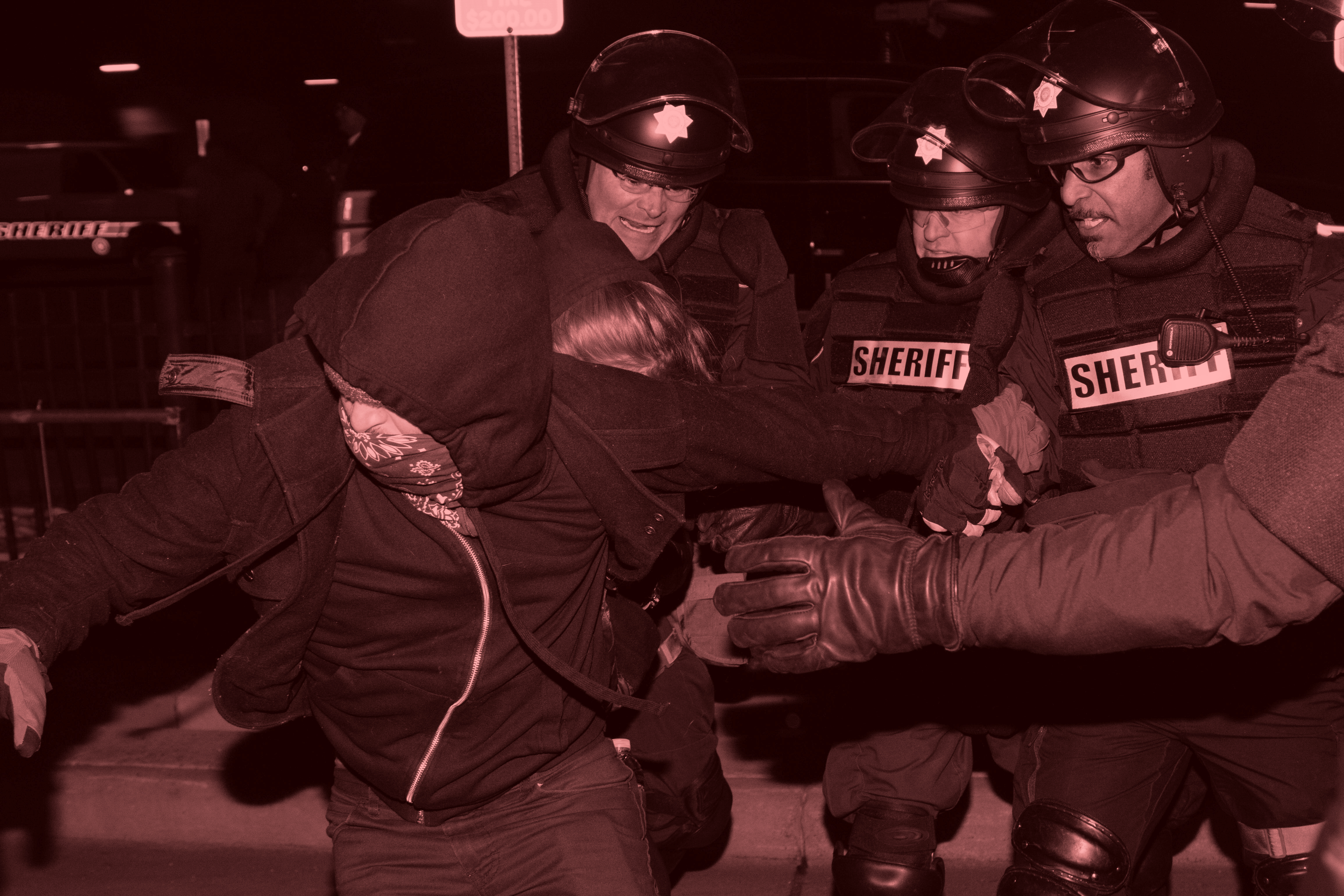
Police officers struggle with protestors during Yiannopoulos’s speaking event. Jan. 25, 2016. (Jackson Barnett/CU Independent)
Across campus on the night of Coulter’s speech, Heraa Hashmi walked into the large lecture hall of Chem 140 as students and community members stared and whispered. Hashmi wears a hijab and knows that it made some attendees uncomfortable.
Hundreds were packed into the expansive room, eagerly awaiting a talk by conservative commentator Ann Coulter, who was sponsored to come to campus by TPUSA.
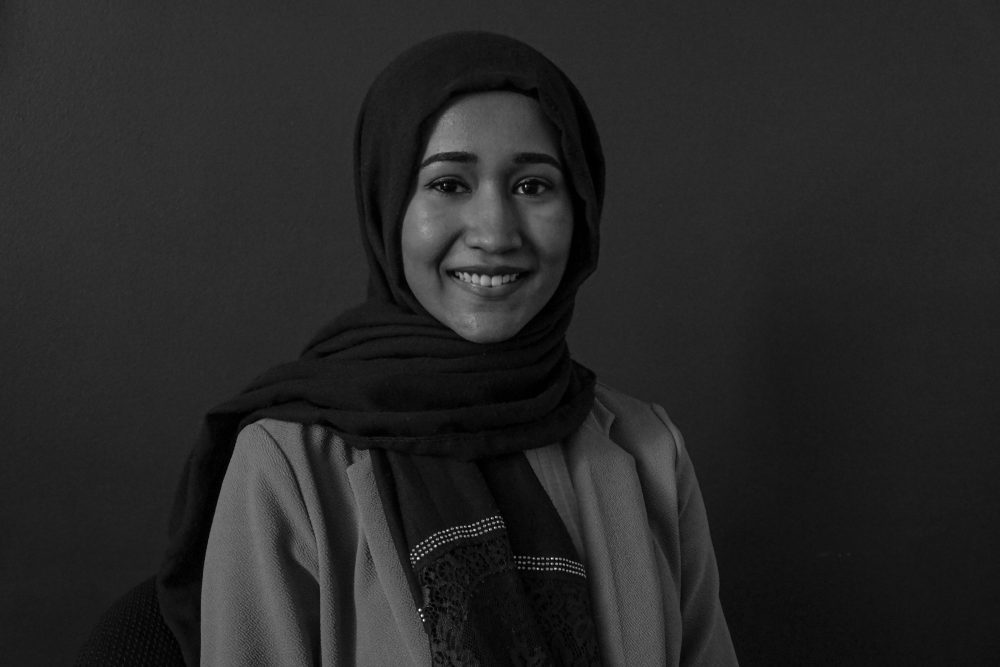
Heraa Hashmi. March 20, 2019. (Fiona Matson/CU Independent)
Hashmi, a senior at CU and former president of the campus Muslim Student Association, took her seat in the crowd and listened as Coulter railed against immigrants and liberals. At one point, Coulter urged the U.S. to bring in immigrants who were “better looking.” Within 30 minutes of the talk, she stood with several other students and marched out as part of a silent protest.
“[Coulter] was exercising her right,” Hashmi said. “But at the same time, the same right that allows her to say the things that she wants to say is the same right that allows me to push back against that and say ‘I don’t think that’s acceptable.’”
As she and other students left the room, attendees booed and chanted “USA,” something Hashmi found interesting.
“That comes out of the assumption that I’m not American, and I am an American citizen,” Hashmi said. “It’s a very weird position to be put in.”
Hashmi describes free speech as the “crux of our nation.” It’s an ideology that grants equal access and opportunity. But for Hashmi, what being an American means for her is having free speech “to the extent that it doesn’t infringe upon others.”
Years ago, in a history class, Hashmi was told by a classmate “not all Muslims are terrorists, but all terrorists are Muslims.” The student asked Hashmi why Islam had never “condoned terrorism.” Following that exchange, Hashmi created a 712-page document listing times and locations for when and where Muslims condemned acts of violence.
Coulter herself has been criticized for her comments on Islam as Andrew Goldstein, treasurer of CU’s Gay-Straight Alliance, states. Goldstein cited Coulter’s comments on a “genocide against Muslims” from a 2017 post in which Coulter lays out three policies for preventing “terrorism in the West”, one of which being to “drop a nuke on some majority-Muslim city involved in terrorism.”
“I don’t think that’s appropriate for [CU] to be inviting people who say that, because it’s suggesting that they don’t care about Muslim students and staff and faculty,” Goldstein said. “It’s not just a difference of opinion, calling for people to be killed.”
For Hashmi, the president’s executive order will only continue to enable such speech.
“We really have to be careful and evaluate [Trump’s executive order],” Hashmi said. “When you bring someone to this university, in a way you are telling the students ‘this is someone whose opinions have validity.’ And to be quite frank, from what I know about Ann Coulter, some of her comments are not worthy of any attention.”
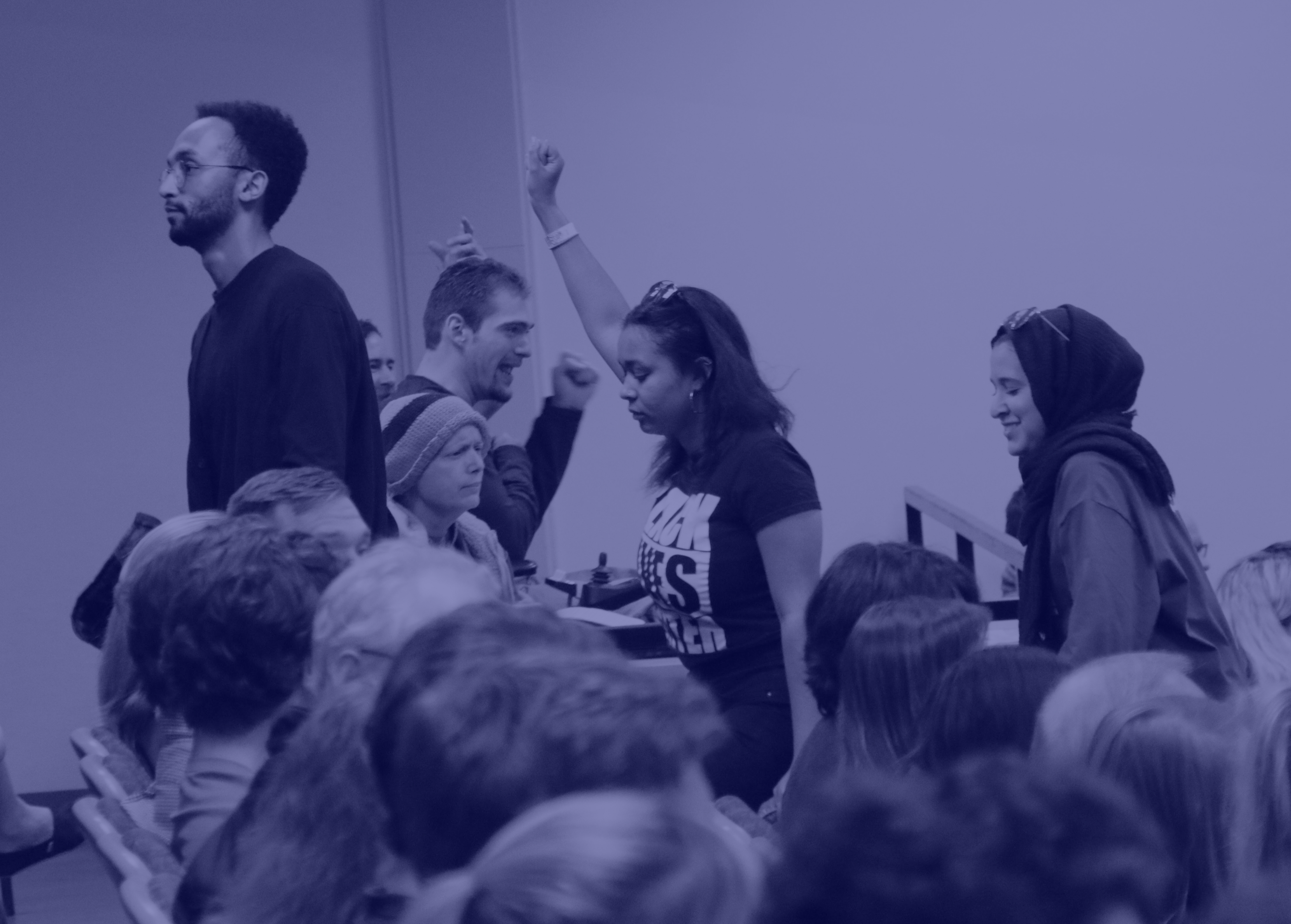
Students leave Ann Coulter’s talk as part of a planned walkout. March 21, 2018. (Bri Barnum/CU Independent)
“Everyone’s entitled to their own opinion,” said Joey Wong, a fifth-year student and member of CU’s Midwestern Asian American Student Union (MAASU) chapter.
Wong understands the issues of free speech but believes CU has their hands tied when it comes to preventing forms of hate speech.
“I think it is kind of out of CU’s control to screen or sort through the speech,” Wong said. “Because if they had to screen or sort, then it wouldn’t be free speech.”
Wong feels that CU needs to do more to facilitate a productive environment for free speech. For him, the constant cycle of divisive speakers yields little benefit to students, specifically in terms of diversity and inclusion.
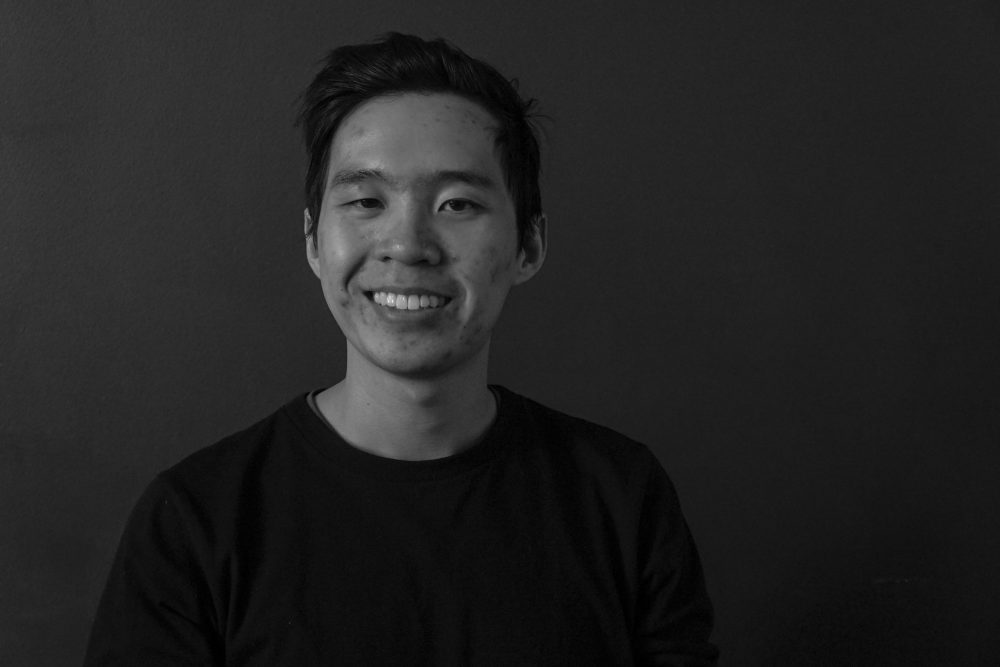
Joey Wong. March 20, 2019. (Fiona Matson/CU Independent)
CU does little to give a platform to other student opinions, said Wong, especially when it comes to minority and marginalized groups.
However, Wong said that student protests have garnered MAASU some connections in the past.
“We try to support our community to be a part of these protests, to really drive them to think ‘hey, we’re part of this Boulder community,’” Wong said. “And if something doesn’t really align with your values, you should seek out this alliance that has the same things as you.”
While not an active protestor himself, Wong said that if anything, protests can help students who may feel sidelined become more integrated within the university community. Wong refers to it as a type of networking.
“This is something we want to promote students to do,” Wong said. “Just so they can know more about where other people are coming from, how they’re approaching problems and how do we ultimately solve it together.”
Wong wishes CU would help student organizations like MAASU continue to meet and spread awareness to new students, something that Wong said has been difficult recently.
“It’s just hard because, in the Asian culture, we kind of keep it to ourselves,” Wong said. “In a way, it hurts us more. We’re trying to slowly change that, trying to speak up more and be a part of the campus protest events and what not.”
In the face of Trump’s executive order, Wong thinks the decision will bring more conscious awareness to how CU “shows that they have free speech.”
“There’d be potential tensions between not only just racial issues but gender issues, sexual issues, social issues to have the courage to speak up after this,” Wong said. “If [CU] doesn’t deal with [the executive order] well, then these problems and animosity will keep rising to the surface.”
Contact CU Independent Senior News Editor Robert Tann at robert.tann@colorado.edu.
Contact CU Independent Breaking News Editor Anna Haynes at anna.haynes@colorado.edu.
Contact CU Independent Multimedia Editor Fiona Matson at fiona.matson@colorado.edu
